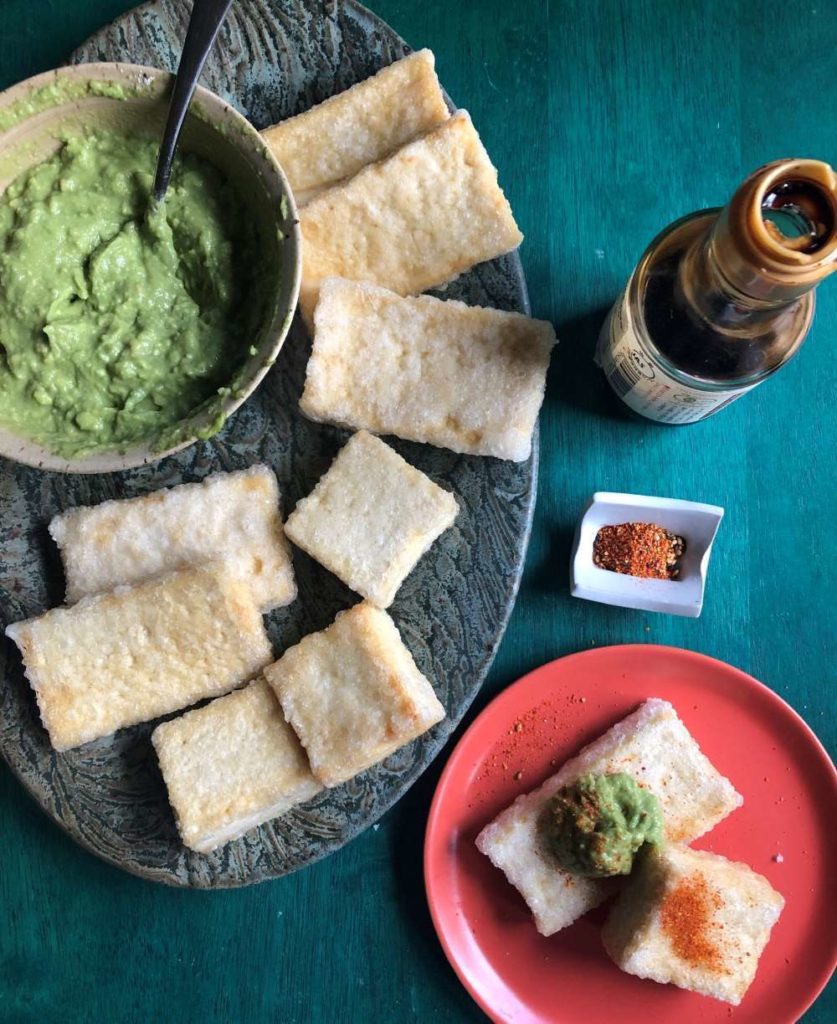
My friend Jeff recently told me he's looking to add more tofu to his life. Specifically, he wants to make crispy fried tofu but without having to deep-fry. I pointed him to recipes in Vietnamese Food Any Day, such as the shaking tofu on page 149 and spicy sweet pomegranate tofu on page 153. Both involve pan-frying cubed tofu then cloaking it in sauce. They're delicious main dishes.
If Jeff were looking for a slightly sinful yet still healthy starter kind of tofu dish, this fried tofu would be the ticket. I spotted it in a 2020 book titled, Rika’s Modern Japanese Home Cooking by Rika Yukimasa. A well-known public television cooking teacher in Japan, she has a knack for presenting accessible recipes. Her book is filled with interesting ideas. What caught my eye about this recipe were many fold -- the crisp chewy fried texture, the microwave tofu draining technique, and the wasabi guacamole sauce. I've made Rika's recipe twice this week because it was easy, fun, and intriguing. Here are a few things for you to keep in mind.
Choosing the Tofu
Many people head for extra-firm tofu at the supermarket but for this recipe, look for medium-firm (called momen in Japanese), or select firm tofu. Medium-firm tofu is considered "regular" tofu in Japan and China. It is tender but don't worry, it will be drained and become sturdy for frying. You'll find it at Chinese and Japanese markets. In California, Trader Joe's "Tofu" in the red and black labeled tub (see below) is medium-firm tofu. There's no indication about texture but it's medium-firm. In the past, Trader Joe's labeled the product as "regular" tofu. My family has purchased it for decades.
Most mainstream supermarkets unfortunately do not carry medium-firm tofu. That's why I suggest subbing more readily available firm tofu.
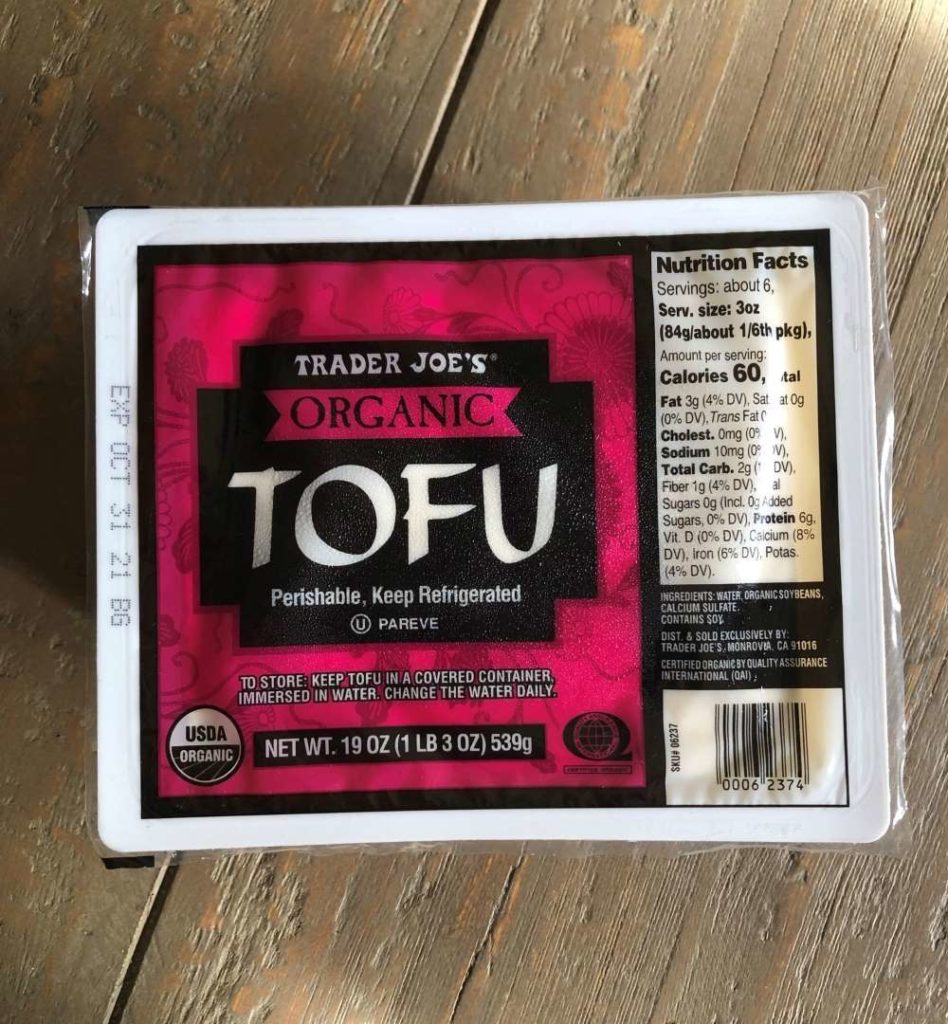
Tofu Draining by Microwave (or Not)
When I was writing the Asian Tofu book, I noticed that some modern Japanese tofu recipes called for draining blocks of tofu in the microwave. Rika calls for doing that. It totally works but you have to let the tofu cool for a spell before cutting it. The amount of time it takes to cool the tofu is roughly the same as the time it takes to cut and let the tofu drain on a dishtowel.
One thing though: it seemed that microwaving the block of tofu yielded a slightly more chewy texture in the tofu. You should try the technique to see if you like it. If you don't have a microwave or don't want to bother, you'll be fine too. Just cut the block and let it hang out for a while.
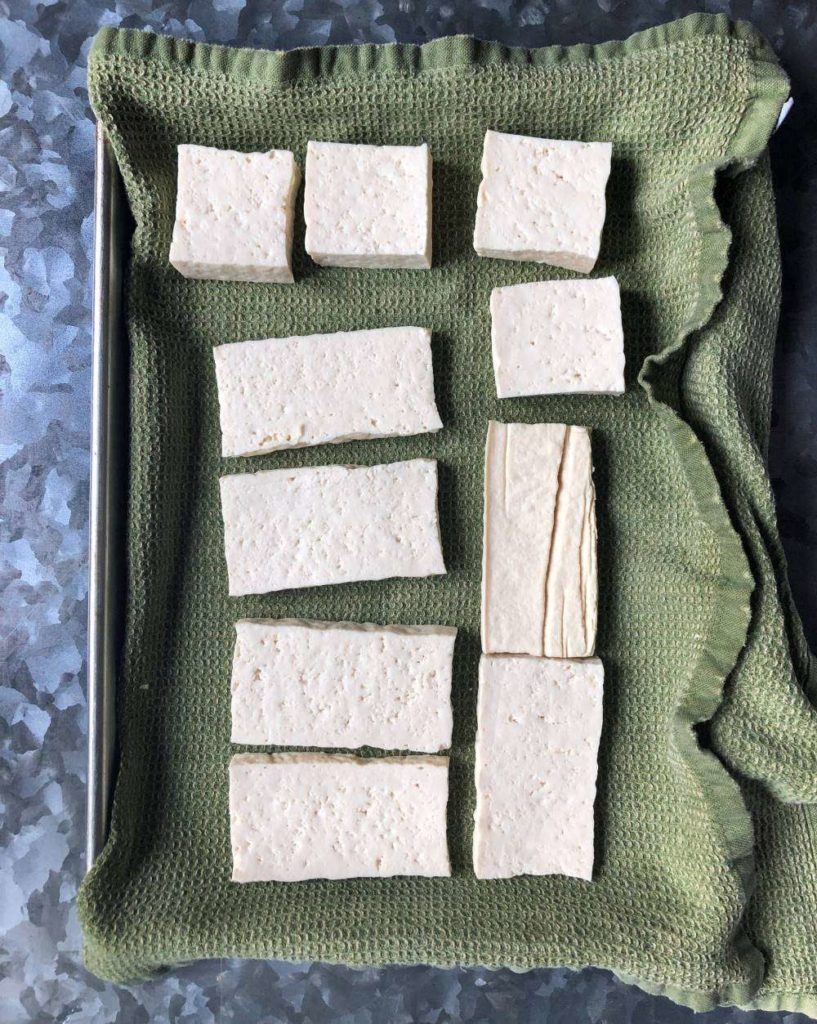
Wasabi Guacamole
Rika's recipe involves a relatively low-key "sauce" of mashed avocado. She uses half an avocado, but after making it the first time and eating nearly all of it as a snack, I decided to double the sauce quantities. You likely think of wasabi and avocado as being for a California roll or something similar but it's remarkably tasty as a sauce (or dip).
The wasabi adds a spicy earthiness to the avocado to lend depth of flavor. I've used regular (Persian) lime and Meyer lemon in the mash and both were great. A standard lemon would be fine too. You can't really ruin something like this mash, which I've re-casted as "wasabi guacamole" because it seems appropriate for a California cook like me. As you see, I did not using fancy wasabi. This canned stuff came from an indie grocer in the neighborhood.
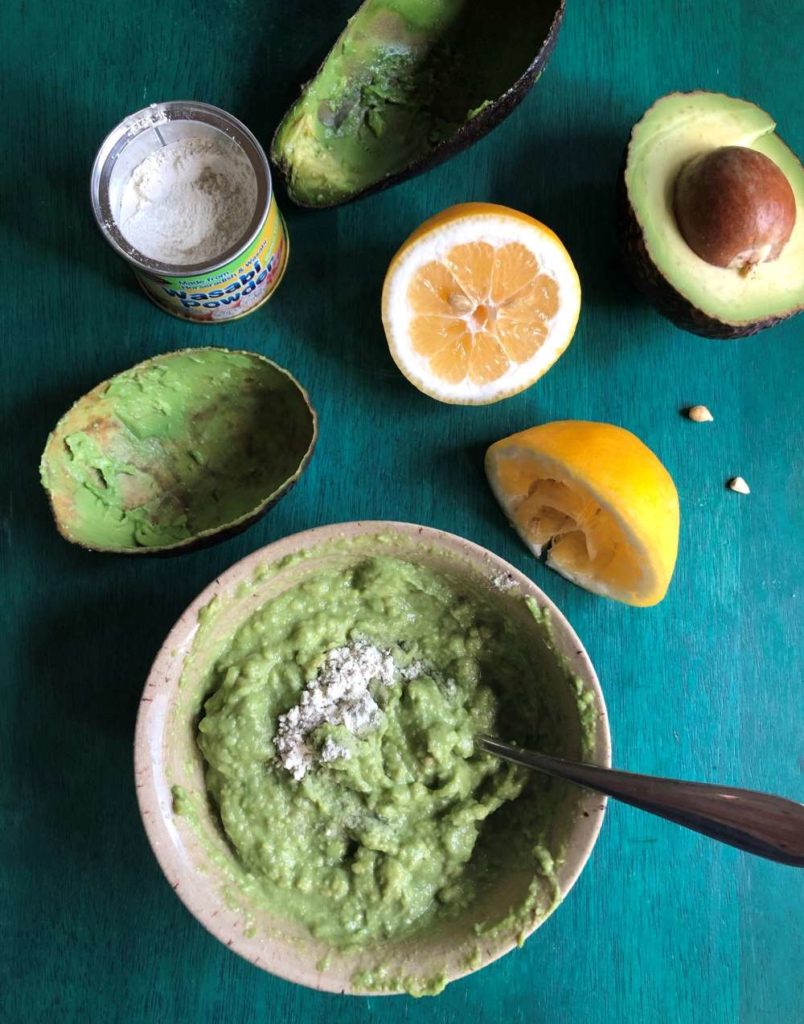
Cut Slabs or Squares?
The first time I made this recipe, I misread the recipe and cut the block of tofu into 4 thick slabs. The book cover image and the one with the recipe showed a thickish piece of tofu. They fried up just fine.
The second time, when I realized that I was suppose to cut the tofu into 8 slices (the recipe used 12 ounces and my block weighed 20 ounces!) I figured I was ok. Partway through, I wondered what if I cut 10 chunky squares instead of thinner rectangles? I bumped up the quantity from the original 8 slices because I had more tofu. They all fried up like the first time out, and required about the same amount of potato starch as the original recipe. So, you may choose how to cut your block of tofu. Go thin or go chunky. My experiment is what's pictured in the draining photo above.
Coat with Potato Starch or Tapioca Starch?
Rika's recipe calls for dredging the tofu in potato or tapioca starch. I favor potato starch because it tends to fry up crunchier than tapioca. I did not use Japanese potato starch (called katakuriko) but just pulled out the Bob's Red Mill brand of potato starch, which is readily sold at many supermarkets and health food grocers nowadays. Check the baking section near other starches. Potato starch is also what's used for this Japanese-style fried chicken so buy a package and you have at least two uses. (You can sub it in a 2-to-3 ratio of potato for cornstarch when thickening recipes.)
I used a small baking sheet (technically a ⅛ sheet pan) to contain the potato starch, dredging, and to hold the coated tofu. The baking sheet is better than a shallow bowl because it's flatter. When I was done, I leaned the coated tofu pieces on the rim because they naturally become damp as they sit waiting for their turn in the hot oil. The set of small sheet pans are among my favorite prep tools in the kitchen. (Sometimes they're used for serving too.)
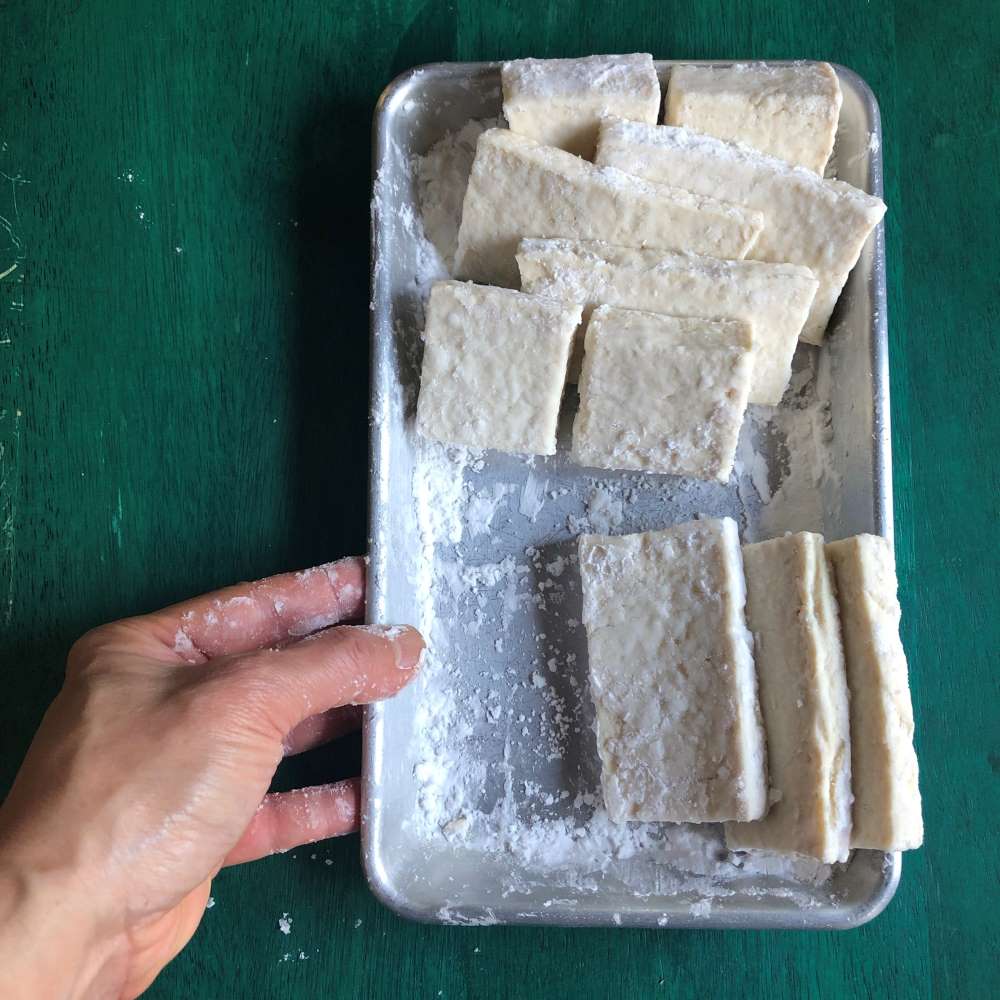
Tofu Frying Tips
These are small pieces of tofu and I use a two-hand approach to flip them -- chopsticks in one hand and a thin turner in the other. For the chunky squares, I stood them on their sides to crisp those areas. Again, wielding two tools helped a lot.
Finally to make frying go faster, fry in a pan that's extra wide. There's more surface area so you can fit more food in the pan without crowding.
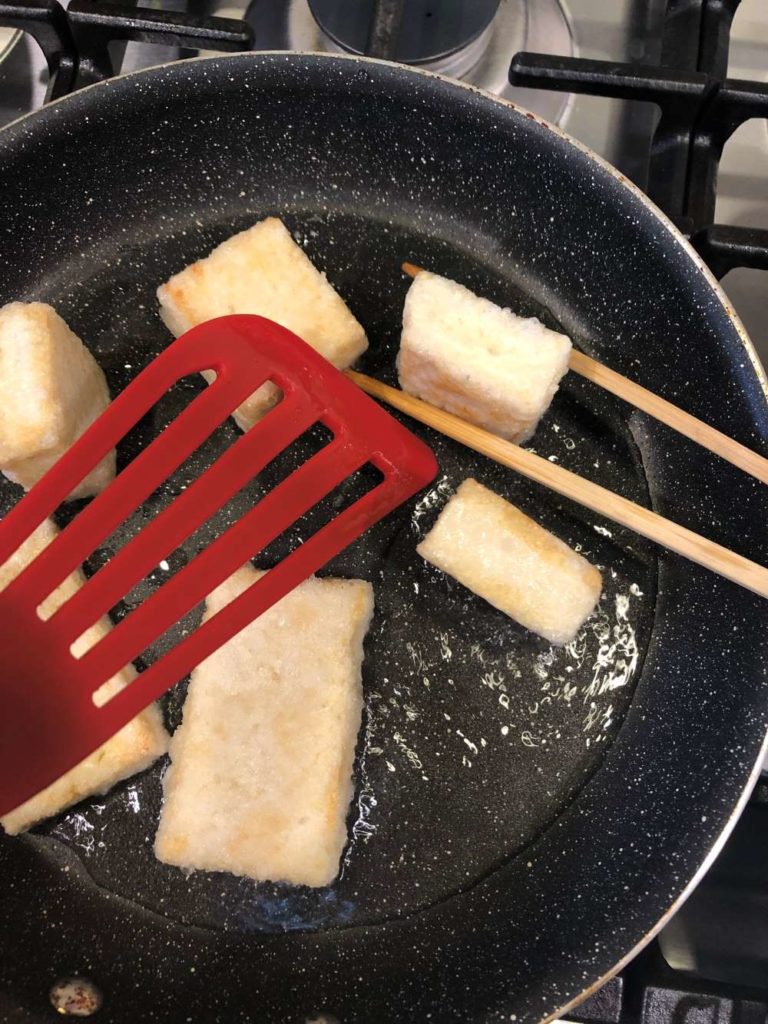
The tofu refries beautifully to a crisp finish. You can fry it up and let it sit for a few hours before refrying in the pan with a little oil, if needed. Use medium heat and the tofu will be extra crispy. It's like twice-frying French fries.
Whether you single or double fry, cool the tofu on a rack because the starch has a tendency to turn somewhat sticky if left to hang around too long on a plate. As the tofu cools, it becomes crisp chewy, which is a very interesting and appealing textural contrast. Regardless, fry and eat up fast.
Oh, one other note: Because I didn't have the umeboshi plum that the recipe called for, I winged it with soy sauce and shichimi togarashi for a salty, slightly spicy hit. If you have Korean gochu garu chile or a similar kind of dried crushed chile, try it out. As you may have already surmised, you can't ruin this tasty recipe.
Fried Tofu with Wasabi Guacamole
Ingredients
- One (16 or 20-ounce) block medium-firm or firm tofu
- 1 medium ripe avocado
- ¼ teaspoon fine sea salt, plus more as needed
- 1 teaspoon wasabi powder
- 1 lemon or lime
- ⅓ cup potato starch
- ¼ cup neutral oil, such as canola or peanut
- Soy sauce, preferably Japanese shoyu
- Shichimi togarashi (optional)
Instructions
- Wrap the tofu in paper towel and place in a microwavable container. Microwave for 3 minutes on high to get rid of excess water. Set aside to cool. When cool enough to handle, cut into 8 to 10 slices, each about ½ inch thick. Set on a dishtowel. (Without a microwave, cut the tofu into slices and set on a clean dishtowel to drain for 30 minutes or up to 4 hours.)
- Meanwhile, make the avocado sauce. Halve then pit and scoop out the flesh from the avocado, depositing it into a bowl. Add ¼ teaspoon salt, ½ teaspoon wasabi, and the juice of half of the lemon. Mash with a fork. Taste then add extra salt by the big pinch, wasabi by the ¼ teaspoon, and lemon juice by the squirt. Aim to balance the avocado’s richness with a savory, mildly spicy, tangy finish. Set aside.
- Pat the tofu dry, season with salt all over, then dredge each slice in potato starch, shaking off excess. Heat the oil in a medium nonstick skillet, and when beginning to shimmer, add the 4 to 6 tofu slices to not crowd the pan. Fry for about 3 minutes per side, until golden and crisp. Cool on rack while you fry the remaining tofu. When done, you can briefly refry any pieces that may have softened.
- Serve on a plate or individual plates. Garnish with the avocado mash, or serve it on the side. Invite diners to drizzle or dip in a little soy sauce and if they like, sprinkle on some togarashi.

















